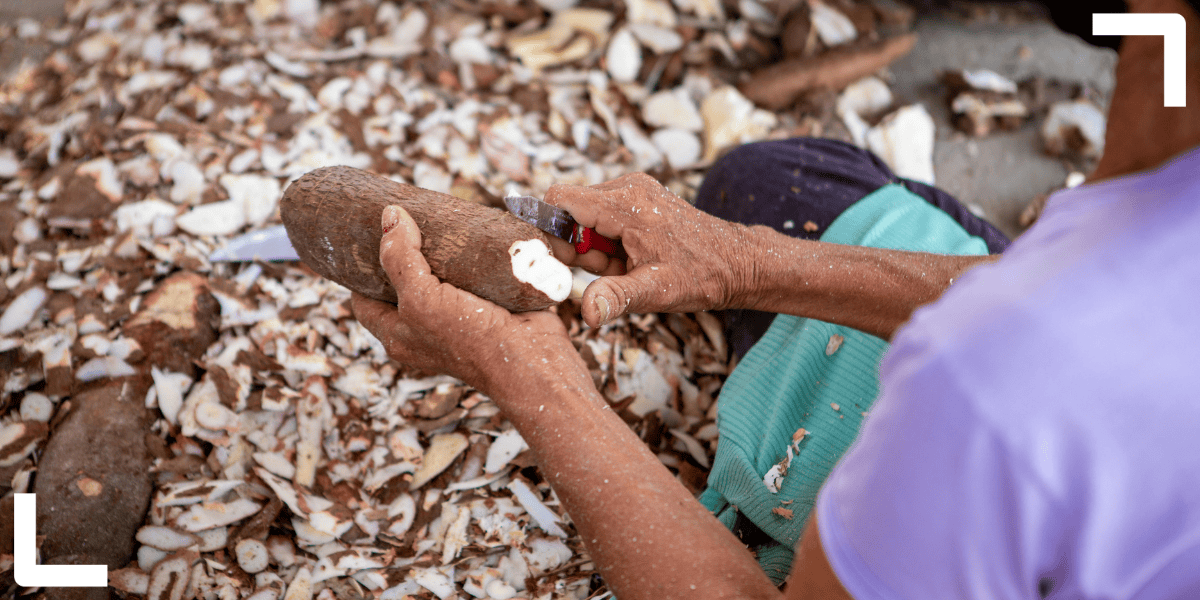Bukavu’s fast-growing population faces myriad challenges when it comes to accessing healthy and nutritious diets. Located in eastern Democratic Republic of the Congo, the city is one of the country’s most affected by population explosion, mineral rush and wars. This has taken a heavy toll on Bukavu’s food security, making it difficult to establish a local food supply chain that is resilient, sustainable and profitable.
In a new ACRC working paper, Bossissi Nkuba, Liliane Nabintu Kabagale, Ayagirwelarha Cishibanji, Pacifique Mwene-Batu, Adrien Burume and Ghislain Bisimwa Balaluka explore the complex challenges these conditions pose to food security and access to healthy diets in Bukavu, and identify potential paths forward for the city.
A complex urban landscape
The capital of South Kivu Province, Bukavu has a population of approximately 1,250,000. Repetitive wars since 1996 have displaced millions, which – together with a boom in mineral exports – has led to Bukavu’s complex and rapid urbanisation. An intense rural exodus led to a tripling of its population between 2000 and 2012. The city is the exit point for minerals (both legal and illegal) produced in the province, and its political economy is based on mineral exports and food imports.
A large portion of the urban community have incomes too low to be able to provide for their daily caloric needs. Local agricultural production cannot meet Bukavu’s demand for staple crops, which are imported. Rice production, fish farming and livestock farming are not developed in South Kivu, because of the presence of armed groups and repeated ethnic and land conflicts.
The city’s food supplies also face the challenges of poor road conditions, high cost of transport, fertilisers and other agricultural inputs, commercial, administrative and fiscal harassment, instability of supplies by the territories, and strong competition from outside products (from North Kivu, Rwanda, Uganda, Burundi, and so on). Recent armed clashes have also led to food shortages, while conflicts in Ukraine and Gaza, as well as the Covid-19 pandemic, have inflated imported food prices.
In-depth assessment of nutrition in the city
In this challenging context, there is a need for an evidence-based understanding of food availability, quality and access in the city’s formal and informal settlements. ACRC researchers conducted an in-depth assessment of Bukavu’s nutrition. The study sought to answer the following questions:
1. What are the key actors in Bukavu’s food systems and how do these actors and community members perceive food availability, food environment and food access?
2. What influences food availability and food access in the context of ongoing conflicts, extractivism and population boom cities?
3. What formal and informal efforts are working towards improving food availability and food access?
Strengthening Bukavu’s food security
The researchers identify a number of existing factors that could positively impact the availability of food and healthy diets for Bukavu’s residents. These include the variability of geographical conditions and agroecological zones that can produce food throughout the year, the possibility for some households (especially those in nearby rural areas) to produce their own food, and the important role that women play in nutrition.
Based on the interviews and analyses, the authors recommend:
- Creating a multistakeholder platform to facilitate access to information on nutrition and food security;
- Passing a law to combat land capture and restore previously captured land to farmers;
- Running public awareness campaigns on healthy, balanced and diversified diets and the link between undernutrition in childhood and non-communicable diseases in adulthood;
- Promoting local agriculture, livestock or aquaculture;
- Introducing targeted training and capacity building for community health workers and project implementation volunteers;
- Engaging in advocacy with the provincial government for investment in nutrition-sensitive activities;
- Introducing training and capacity building for nutrition programmes within government agencies;
- Strengthening the National Nutrition Programme (PRONANUT);
- Conducting malnutrition studies in those groups with nutritional vulnerabilities;
- Supporting the monitoring and evaluation of nutritional problems in collaboration with research institutions, sectoral ministries and international partners.
Header photo credit: marquino rocha / Pexels (via Canva Pro). Woman peeling a cassava root.
Note: This article presents the views of the authors featured and does not necessarily represent the views of the African Cities Research Consortium as a whole.
The African Cities blog is licensed under Creative Commons Attribution-NonCommercial-NoDerivatives 4.0 International (CC BY-NC-ND 4.0), which means you are welcome to repost this content as long as you provide full credit and a link to this original post.


